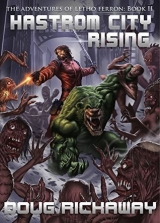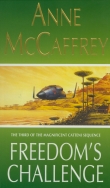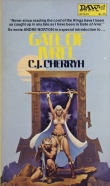
Текст книги "Hastrom City Rising (The Adventures of Letho Ferron Book 2)"
Автор книги: Doug Rickaway
Жанры:
Классическое фэнтези
,сообщить о нарушении
Текущая страница: 2 (всего у книги 21 страниц)
Alastor leaps atop it, and it rakes the claws of its good limb across his side, tearing the flesh to tatters. He grabs the paw with a free hand, the other grasping the matted fur on the creature’s chest for purchase. He twists and pulls, and the bear’s paw separates from the arm, spraying his naked body with blood. The she-bear mewls and lies back on the ground, exposing her neck, surrendering. He reaches forward with both hands to tear out her windpipe.
It is a ruse. A desperate attempt at survival. The bear’s head snaps forward with alarming speed and clamps down on Alastor’s left arm. But he brings his right fist around and slams it into the beast’s eyesocket, finishing the job he began with the sword Edulf gave him, crushing bone and smashing the creature’s brain.
The child of Tar-sun falls limp on the floor of the cave.
Alastor stands, surveying his victory. He traces parallel lines with his fingers through the blood spattered across his chest. Then he clears away some of the blood on his forehead in the shape of a circle, revealing the pale skin beneath.
With a mighty twist he removes the bear’s head and tosses it aside. He sinks his hands into the ragged flesh that once was a neck, and begins to tear the beast’s hide from its back. When he is done, he stands and wraps the gory hide around his shoulders.
Satisfied with his raiment, Alastor picks up the bear’s head and begins to make his way to the entrance of the cave.
****
Alastor is surprised to see that those who accompanied him up the mountain have deserted him. How long has he been inside the mountain? He hears the soft susurration of branches in the wind and the gentle percussion of water dripping from thawing ice. Could it already be spring? Smiling, he begins to trudge down the mountain. He finds the trip down to be much easier than the climb up as he plows through the snow, sending it flying in all directions with the furious pumping of his legs.
Before long he reaches the outskirts of his village, and his spectacular descent down the mountain has drawn a crowd. Members of his tribe have gathered in the center of the small clutch of sod-brick buildings, just outside the largest. It is the home of Edulf, his former lord. Alastor walks toward the crowd, reveling in the fear and confusion he sees. The smell of it is intoxicating, but he resists the urge to reveal the serpents that live in his belly, to feed on anyone foolish enough to draw near him. He can still hear Abraxas’s voice in his mind, barely a whisper at this distance, telling him that it is not yet time.
“Edulf. Come forth.” Alastor’s voice is dark and rich in the crisp night air.
Hide curtains hanging in the doorway fly open, and three men spring out, swords winking at him in the moonlight.
“Who are you?” Edulf asks. The two men—one of them Hrogar, the other Edulf’s oldest son, Edun—position themselves in front of their Sundin.
“Don’t you recognize me, old man?”
“Alaric?” he says, eyes flicking up and down, taking in the strange figure before him. “This cannot be. What trickery is this?”
“No trickery,” Alastor says. With a theatrical flourish he brings forth the cave bear’s head, and the crowd gasps. “Behold, I bring you a gift. A token of my master’s good will.”
He tosses the bear’s head onto the muddy earth between them, where it lands with a meaty thud. Its one remaining eye stares back at Alastor.
“You are not Alaric. He is not so tall!” says Edun.
“You are right. I am not Alaric, for he has perished inside the mountain. My name is Alastor.”
“Speak to him no more, father. He reeks of draga. His words are poison.” Edun speaks through clenched teeth.
Edulf surveys the creature before him. “What are you? Man or draga?” he asks.
“Neither. I serve a being greater than any you have ever known. Greater than all of the pitiful gods the holy man speaks of. I come in the name of Abraxas, the old one who lives atop this mountain.”
“We have no need of this Abraxas,” Edulf says. The old man’s diseased lungs rumble, and he hocks and spits on the ground at Alastor’s feet.
“Ahhh, Edulf. We do not have to make this difficult. The transition can be painless if you allow it.”
Alastor can tell from the dim expressions on the people’s faces that they can’t quite grasp what he is saying.
“Enough of this!” Edun shouts.
Edulf’s son raises his sword and lets forth a battle cry meant to melt Alastor’s resolve. But instead of fear, Alastor is filled with pity for the man, that this is the best display that he can muster. Alastor knows what comes next, though the fool trudging through the mud does not. Until this moment, everything that has ever stood before Edun has fallen, cleaved asunder by the kiss of his mighty blade. Alastor sees arrogance glimmering in Edun’s eyes, and he almost comes unhinged at the sight of it.
Edun lunges and swings his sword. Alastor catches it with his left hand; it cleaves his flesh and lodges in the bones of his palm. He closes his hand around the blade and snaps it in two.
The tip of the blade flies high, but Alastor plucks it from the sky and plunges it into Edun’s head. It pierces Edun’s skull as though it is an egg and continues downward through the tender flesh of his chin. Alastor kicks Edun’s limp body aside and examines his own hand. The flesh is already knitting itself back together. There is no pain. Just a tingling sensation.
Alastor hears Edulf’s hoarse cries. He looks up to see that his Sundin, the man who protected his people from night-beasts and raiders alike, has fallen to his knees. The man Alastor’s father served with great loyalty until the day he died.
No, not Alastor’s father. Alaric’s.
From his star boat atop the mountain, Abraxas feeds Alastor a series of images. They are all of Edulf. He sees the old man take women to his bed that don’t belong to him. Some of them against their will. Some of them are mere children. He sees Edulf arguing with Alaric’s father, their faces growing bright red, their eyes wild. Then he sees Edulf make a small gesture with his hand, and a man steps from the shadows and runs a blade across Alaric’s father’s neck, and the vision fades in a spray of lifeblood.
He killed my father! says a voice in Alastor’s head.
No, not my father. Alaric’s.
At some point Alastor closed the distance between himself and Edulf. He now stands over his Sundin, who looks up at him with swollen red eyes. Hrogar twitches in Alastor’s direction, but Alastor shakes his head.
“Don’t, Hrogar. Please.”
“How do you know my name?”
“I know it because Alaric knew it,” he answers. But he doesn’t look at Hrogar. He continues to peer down at the old man before him. He has never before realized how frail the old one has become. The way his back has taken on a crooked shape, the way his axe hand shakes. Surely if he does not die now by Alastor’s hand, it will happen sooner rather than later. Someone stronger will claim the throne. It is the way of things.
“Alaric, it is you, isn’t it? Why are you doing this?” Hrogar pleads.
“I am doing what must be done. This old man is no longer fit to lead us. Look at him. See how he cries like a washerwoman. Look how he yellows the snow in front of you.”
“Alaric, don’t.”
“I told you, Alaric is dead. As you will be if you don’t stand back.”
Alastor feels his last human emotions. He feels remorse as he looks upon the face of his childhood friend, Hrogar. He thinks for a moment of the things he has done this night, the terrible choice he has made. He feels shame, that Hrogar should see him this way. But it does not last, for Alaric and Alastor cannot both occupy his flesh, and Alastor is stronger.
“What are you waiting for, draga? Do your worst,” Edulf says.
With pleasure.
But Edulf is not prepared for Alastor’s worst. He screams as Alastor’s jaws pop and snap wide open. Alastor feels the slithering sensation, like someone pulling something out of his stomach and up through his throat. The tentacles spin out and reveal their barbed ends. They lance forth, almost of their own volition—so eager to feed are they—and embed themselves in Edulf’s neck and chest.
Alastor’s first feed sends orgasmic waves spilling forth from his chest, shocking his limbs with a pleasure more intense than any he has ever known.
When he is finished, there is little left of Edulf but a withered husk.
Alastor turns his attention to Hrogar, who has gone white, his eyes bulging with terror. Alastor steps toward his old friend, who begins to weep. They are standing face to face now. They survey one another for quite some time, each staring deep into the other’s eyes. Alastor sees fear in Hrogar’s eyes, but also something else—something he can use.
He places his hands on Hrogar’s shoulders, and Hrogar kneels. Alastor puts his hand on Hrogar’s head gently, like a doting father, and speaks:
“It is well, Hrogar. Rise and join me, old friend. We serve a powerful god, and a new day dawns. See for yourself.”
The great burning eye of the world has opened at last, far out among the misty depths of the horizon. The rays of dawn bathe the clouds and sky in glorious ochre, and Alastor basks in the warmth.
ONE – The Return
The night sky over Hastrom City was tranquil. Over the generations the sky had grown clear again as the land reclaimed the city, and the factories, having surrendered their incessant rumblings, crumbled to ruin. On a night like this, one could cast one’s eyes upward and see an infinite sea of twinkling pinpricks, strewn across the sky like chaff blown from an open palm. Upon first glance it all looked like chaos, but to those who knew where to look, there was the arrangement of stars known as the archer, his bowstring drawn taut for all eternity. Perhaps tonight he hunted for Ursus, the great bear in the sky, from whom this world drew its name.
For as far as the eye could see, crumbled asphalt spindled out in all directions. And all along these roadways, sentinels of every shape and color stood watch, noting the passage of skittering shadows with their plastic headlamp eyes.
One such steel husk was now the home to a clutch of robin’s eggs. The mother robin hopped from side to side in quick jerks, seeing to them as best she could in this fouled wasteland. But when a foul claw struck out from the shadows below, the mother’s worries for her children were needed no longer. The insidious sound of smacking jaws and the frail pops of tiny unformed bones filled the air. A lusty belch was followed by chattering and misshapen words.
They moved within the shadows, always mindful not to be seen. Their bent backs were pitiful. Their limbs, marked with all manner of flesh-consuming plagues, were bent and deformed, and would be all but useless save for the bony claws at the ends of their fingers. Their faces were runny and malformed, a remorseless deity’s joke.
Over the city a red eye opened, and a mote was expelled. It streaked across the sky, enveloped in orange and white. The fell creatures that dwelled among the shadows cast by Hastrom City, having long forsaken the wisdom of older ages, believed it was the coming of a new god.
In some regards they were correct.
As the falling star entered the atmosphere, its wreath of flame disappeared. The ship settled into a hovering pattern, easing over the land like a god hand. It revealed itself to be a starship—not that the creatures below had any knowledge of such things. It roared above them, edging toward cruising speed, causing the autos below to tremble in its wake. The fell creatures pointed at it with their crude flipper-like arms, and they began to ululate in their foul language.
Alastor caressed the navigation orbs, steadying the course of his great ship. He studied the broken landscape, making note of the number of creatures below. Their veil of shadow provided no refuge from the all-seeing eye located on the bottom of his ship. For sport he turned on a searchlight and rained down pitiless white light on the creatures, searing their filth-encrusted eyes, casting them into scrabbling fits of terror.
Within moments he was crossing over into the urban honeycomb that was Hastrom City. He noted that a great wall had been erected, encircling the heart of the city, and he was pleased to see a complement of watchmen patrolling. He chuckled as one of the guards split the head of one of the fell creatures with a bullet from a high-powered sniper rifle. The soldier waved, and Alastor waved back, feeling foolish when he realized the soldier couldn’t see him.
The ship passed over a pyramid-like building in the middle of the city, much like those found in the center of the Fulcrum stations, and slowed to a glide over a landing bay. From his perch, Alastor perceived the people below as ants scrambling to and fro. As the ship eased down, the ants grew larger and morphed into men, yet their movements and aspirations still seemed ant-like as they clamored to meet him and his Lord at the landing bay.
Alastor would not need the ramming head of his ship for this incursion. Already the men were gathering to receive him, jostling for placement in the great reception. Landing struts groaned from lack of use as the ship landed on Eursus as lightly as a bird on an oft-used perch. The entire ship’s frame shuddered, and a readout in ancient characters let Alastor know that the landing process was complete. He turned from the console and faced his master, who reclined in the enormous commander’s chair. Alastor bowed his head and spoke:
“My Lord. We have at last arrived. Are you ready to meet your subjects?”
“Indeed. Let us introduce these men to their new ruler,” Abraxas said, his words almost haughty, and certainly celebratory.
Already quite the king.
“What was that, Alastor?” Abraxas said, rising from his chair. Alastor remembered to mind his thoughts as he surveyed Abraxas’s formidable frame. Since his rebirth, the old one had come to resemble the Tarsi that he once was, though his skin was still hairless. It would take some time to become accustomed to this new Abraxas. No longer encased in the ruined prison of his own body, he could now lash out at his servants at the first sign of displeasure. Not for the first time, Alastor worried that his master no longer truly needed him now that he was free to interact with the physical world. He was going to have to play his cards with all the guile that he possessed.
“Pardon me, sire?” Alastor asked, his face a mask of bewilderment.
“You have grown quite strong, haven’t you? Your thoughts are harder to read as of late, but I can still sense the color of them, Alastor.”
“I assure you that my thoughts are only of the ways in which I can continue to serve my great Lord. Seeing you in your true form, I almost feel unworthy, mighty Abraxas.”
Alastor took a knee, feeling the air around him compress a little, squeezing his body.
And of course, there’s that, Alastor thought, as Abraxas’s power crushed his body, just enough for discomfort. Alastor could feel the vast wellspring of his master’s power, and was humbled. And then the invisible claw withdrew, and Alastor was able to move again.
“Forgive me, my Lord. I meant nothing. I am simply weary from our journey.”
“Of course, my son. Shall we?” Abraxas motioned toward the exit, and Alastor nodded and massaged stiffness from his shoulder muscle. Abraxas moved toward the door, and Alastor took his place behind him.
****
Alastor could feel a static charge in the air, could smell the acrid-sweet aroma of ions that heralded a coming storm. He took his place behind his master, careful to keep one stride between himself and Abraxas, and together they made their way down the ramp to meet the welcoming party. A cadre of Alastor’s finest soldiers spread out to form a line behind them.
At last, I am home.
The Eursans fell prostrate at Abraxas’s feet. He stood there for a moment, allowing them to worship him.
“Which of you is Chancellor Steigen?” he asked.
“I, Lord Abraxas,” said an older man from the floor. His garb was ornate while the others’ were industrial hues: grays and tans.
“I should have known. Please rise, Chancellor Steigen.” The man rose to his knees, and then, with grinding effort, to his feet. He regarded Abraxas with wide eyes.
“You will have to forgive me, Lord. I am not as spry as I used to be,” he said, breathless.
“How you prattle. If I wish to know more about a dog, I shall ask its keeper. Who is your keeper, dog?”
“My lord is Abraxas!” he said.
“Yes, dog. You must learn not to speak in front of your betters. But I am feeling generous this evening. Perhaps it is the coolness of the air that soothes me. I shall allow you to live for another day.”
“Oh, thank you, master, thank you!” Steigen gushed with the joy of one who knows that the executioner’s hand has just been withdrawn from his axe. To Alastor, such groveling was sickening, but then he remembered the episode in his ship’s command center, and took care to guard his thoughts.
“Now, if your mind is not too terribly addled, perhaps you can take us to speak to those we have come to see,” Abraxas said, no longer bothering to hide his petulant exasperation.
“Very well. Lord Abraxas, Sir Alastor, will you follow me? I have prepared everything.” This time the foolish man made sure not to engage in eye contact with either him or Abraxas.
Dogs can be taught, after all.
Chancellor Steigen led them through cramped hallways lit with the type of industrial lighting that could only be described as adequate. They flickered every few seconds, casting a strobing effect on the occasional worker that strode by. Alastor took note of a short, burly man wearing threadbare blue denim coveralls that were smattered with petrol smears. The man grinned, treating Alastor to a mouthful of misshapen black lumps that were once teeth; his eyes, stupid but twinkling, were deep-set beneath a pronounced brow.
Alastor examined the tile floor below him. Though scrubbed clean, it could not hide the abrasions and wear marks of heavy use. There were smudges on the painted cinderblock walls that no number of cleanings could remove.
“This place is filthy!” Alastor sneered. “You were instructed to make it suitable for Abraxas’s arrival.” Steigen’s face went white, and he seemed to be struggling to force words from lips that would not obey.
“Well, sir, it is a public building, not a palace worthy of Abraxas, I know. But we did the best we could,” he answered. “The labor sector, as you know, is not cooperating, and—’’
“Yes, we know all about your inability to control those under your charge. Rest assured, we will—” Alastor interjected, but he was interrupted by Abraxas’s hand on his shoulder.
“Chancellor Steigen, this is the very reason we have come to help you,” Abraxas said.
Alastor sighed and turned his attention back to Steigen. “It will suffice for the time being, so long as it does not collapse. You haven’t had any buildings collapse lately, have you, Steigen?”
“None in this sector, sir.”
“Your assurance does little to comfort me. But as I have said, these quarters must suffice for now, provided that construction begins on the palace very soon. Lead on, please.”
Steigen’s eyes darted from Alastor to Abraxas, who nodded his assent. Then he turned and led them to a set of double doors at the end of the hallway. He opened the doors, then stepped aside and bowed, gesturing for them to enter the conference room with a sweep of his arm.
“If you will take your seats, my lords, Premier Eladin will be with you momentarily.”
Chancellor Steigen motioned toward a set of office chairs flanking an imposing oak desk. At the head of the table was an ornate throne. It was carved from a rich, dark wood, its surfaces swirled with beautiful burls.
“Lord Abraxas, how do you like it? One of our artisans carved it as a welcoming gift,” said Steigen, wringing his hands. Alastor noticed that Steigen was trembling and didn’t dare make eye contact with Abraxas.
“It is beautiful, Steigen. Please give your artisan my thanks.”
On the meeting table was a large object under a tarp.
“And this, my Lord. Your headdress, as you requested,” Steigen said, pulling the tarp aside with a flourish. Underneath the tarp sat a golden headpiece that resembled a fierce Tarsi.
“It is delightful,” Abraxas said, taking a seat in his carved chair. “Alastor, if you please.” He looked at the headdress, then back to Alastor, tapping his claws on the arms of the chair.
“Right away, sire,” Alastor said, striding to the table and lifting the headpiece off the table. It was heavy, an indication of quality craftsmanship. He placed it on Abraxas’s shoulders.
“It is wonderful. I can see perfectly through the eyes. It is the perfect visage with which to receive and address my subjects,” Abraxas said.
“It is not too heavy, my Lord?” Steigen said, hands trembling.
“A king’s crown should be heavy, to remind him of the burden of his duty. Well done, Steigen.”
A wide spectrum of emotion passed over Steigen’s face. His eyes glistened with tears.
“Steigen, if you are done bawling, perhaps you could please bring us Eladin and his advisors,” Alastor said.
“My Lord, they come.”
Maroon curtains on a far wall began to part, creaking and groaning on some unseen ancient mechanism. A sort of stage appeared, adorned with five small silver pedestals embedded in the floor and arranged in a diamond pattern, with one in the center. The whine of old computers awakening filled the air, and images began to appear above the pedestals: first spectral human outlines ringed by dancing motes of dust, then full three-dimensional figures. The illusion was quite convincing, save for the occasional shimmer as data pipes struggled to push the large amounts of audio and video.
There were five of them—three men and two women—dressed in charcoal-hued suits. Bright ties, cravats, and silk blouses popped in vibrant colors that were accentuated by the 3D holograms’ real-picture enhancement. The man in the center seemed to be the leader, for the others were watching him, as if waiting for cues. Alastor noted his height and his broad shoulders. He was middle-aged, black hair streaked with austere gray at the temples. He flashed a smile, but the eyes above the pearlescent grin were cautious and hawk-like.
“Lord Abraxas, Master Alastor,” said the grinning man. He dropped to one knee, his silk suit swishing. The others followed suit. Alastor noticed a single bead of sweat coursing down the side of the holo-man’s face.
“You must be Premier Eladin.”
“Yes, Lord Abraxas. We must apologize that we cannot meet you in person due to circumstances you are no doubt aware of. We hope that these real-3D representations are pleasing enough. What can we do for you?”
“Whether you appear to me in flesh or as photons matters not to me. I need only to know if you and your Corpus Verum agree to our terms,” said Abraxas.
Eladin turned his head as he peered at Abraxas. “And what terms are you speaking of?”
“An agreement your chancellor has brokered.”
At this a tumult of hushed words and exchanged looks of fear erupted from the councilors of Hastrom City.
“Sir, we know of no such—”
“SILENCE, mongrel!”
The lights dimmed, and the air seemed to grow ten degrees colder. Steigen shivered and recoiled, looking as though he wished to shrink and scamper away. Alastor only smiled and placed his metallic boots on the table with a pronounced clank.
Abraxas cocked his great, obtuse head, cracking the bones in his neck. He took a deep breath, held it, then released.
“Alastor, would you please outline our plan for the council?” he asked.
“Gladly, my master.” He turned to face the councilors. “We understand that you have been having trouble with the so-called ‘artisans’ in the labor sector,” he said, gesturing to Abraxas’s ornate chair.” They have been clamoring for more wages, food rations, et cetera. We also understand that there have been reports of militant activity, of public demonstration. You cannot address this issue in your current… situation… as Chancellor Steigen has already brought to our attention.”
Alastor paused to let this sink in, then continued. “We will help you to eliminate any signs of rebellion, and we will provide security for you and your cohorts. Your sanctuary will not be breached. You will continue to run the infrastructures of this great city, and we will keep the peace between you and the lesser beings in the artisan sector. In addition, we will help you reclaim the land surrounding your city. More territory means more agriculture, and we can increase the food rations for all, while providing them with work and wages.”
“You would do all this? Why? What’s in it for you?” Eladin asked.
“We ask for only a small thing: a place for our species to survive. The dawn of a new era is upon us. Eursans and Mendraga will live in perfect symbiosis. All we ask for is permission to harvest the one thing a Mendraga needs to survive: fluid from Eursan bodies.”
“You expect us to allow you to murder our citizens? That’s barbaric!”
“Of course not. We would process this transaction in a most humane way. All citizens, in exchange for protection and increased food rations, will have to make a weekly donation. The harvesting process would be relatively painless—its only side effects being mild light-headedness and nausea.”
“I am sorry,” Eladin said. “At this time I cannot authorize such a thing. If you could just give us some time to consider your most generous offer…”
“I was afraid you might say that. Chancellor Steigen?”
Steigen jerked like a gun-startled horse. He trembled as he stood and faced Alastor.
“Yes, my Lord?”
“We seemed to have reached an impasse in our negotiations. Is there anything you can do to persuade our friends from Hastrom City?”
Chancellor Steigen looked between the projected councilors and the extra-terrestrial visitors. His eyes brimmed with tears, and he dropped his head. When his eyes met Alastor’s again, Alastor nodded once.
“I had hoped that it would not come to this. Forgive me,” Chancellor Steigen said.
He went over to a computer terminal in the back corner of the room and began to enter rapid commands.
“Steigen, what are you doing??”
Steigen did not reply, his face lit by flashes of color as protocols streamed past his eyes. A crude pyramid shape appeared on the screen, filled with thousands of rectangles arrayed in rows, each rectangle containing a single name. Chancellor Steigen reached out with a slender finger and touched the rectangle at the top; it expanded to fill the screen. On it were the vital signs of Premier Eladin, including heart rate, body temperature, and mood. Eladin’s heart rate was highly elevated, and his mood was indicated in red flashing text:
AGITATED
“Steigen, don’t… please.”
Steigen entered a series of keystrokes, and a small button appeared in the bottom right corner of the readout. Steigen reached out with his slender finger and pressed it.
TERMINATE? YES or NO? THIS OPERATION IS IRREVERSIBLE.
Steigen pressed “YES.”
Eladin’s glowing projection disappeared. The councilors began to shriek and sob.
“What have I done?” Steigen’s body swayed, and he reached out to grasp the terminal to steady himself, but his arms had become senseless. He collapsed to the floor.
“I wish to speak with the Corpus Verum directly. For the gods’ sakes, Alastor, can you get the damned chancellor off the floor?”
“Certainly, sire.”








